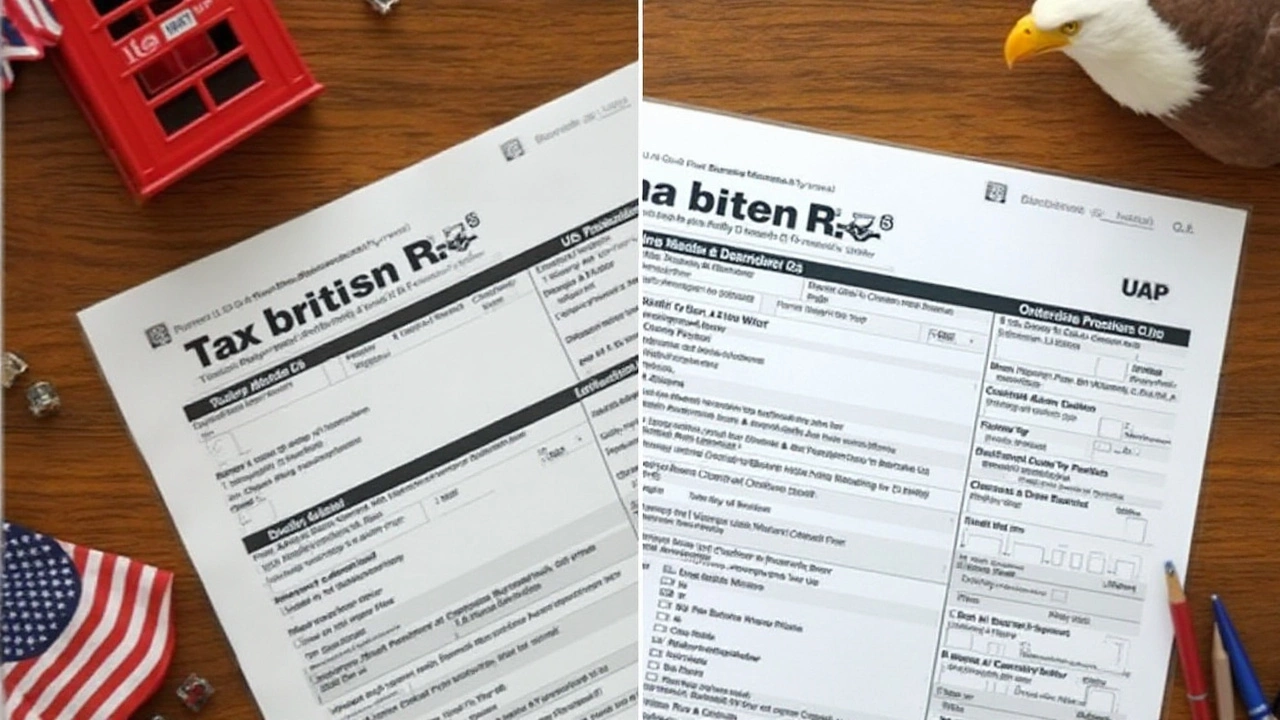Understanding Tax Implications of ISAs for US Investors
 Jan, 5 2025
Jan, 5 2025
With the growing interest in international investments, Individual Savings Accounts (ISAs) have captured the attention of investors around the globe. However, for those living in the United States, the taxation of ISAs remains a pertinent question. Unlike in the UK, where ISAs offer tax advantages, the situation for US taxpayers can be distinctly different.
Understanding how ISAs fit into the US tax landscape is crucial for avoiding unforeseen tax liabilities. You'll find this guide useful whether you're thinking about investing in an ISA or you already hold one and want to manage your tax obligations effectively. Let's delve into the world of ISAs and see what tax considerations might arise in the United States.
- What is an ISA?
- Tax Implications for US Residents
- Navigating Tax Treaties
- Reporting ISAs to the IRS
- Managing ISA-related Tax Liabilities
What is an ISA?
An Individual Savings Account, commonly known as an ISA, represents a unique approach to saving and investing money, predominantly used in the United Kingdom. One of the standout features of an ISA is the tax-advantage it offers, allowing individuals to save a substantial amount over time. With an ISA, the interest or investment gains earned are not subject to UK taxes, making it an attractive option for savers and investors alike. First introduced in 1999 by the UK government, ISAs were designed to encourage saving by offering tax breaks to account holders. The UK has made several adaptations to the ISA framework over the years. Initially launched to replace earlier savings schemes, ISAs became a vital tool in financial planning for many UK citizens, adapting to the ever-changing financial needs.
ISAs come in several varieties including Cash ISA, Stocks and Shares ISA, Innovative Finance ISA, and more recently, Lifetime ISA. Each type caters to specific financial goals and offers unique benefits. A Cash ISA is similar to a regular savings account, allowing savers to earn interest without paying tax on it. On the other hand, a Stocks and Shares ISA enables investments in stocks, bonds, and mutual funds, wherein the profits and dividends generated can grow free of any UK tax liabilities. Let’s not forget the Innovative Finance ISA, which opens the door to peer-to-peer lending investments, offering potential for higher returns, albeit at greater risk.
How ISAs Differ Internationally
While ISAs solve significant tax problems domestically, they present a different picture for investors residing outside the UK, such as US persons. Surprisingly, although ISAs protect UK taxpayers from income and capital gains taxes, these accounts do not enjoy the same tax-free status with the IRS. Consequently, income and gains in ISAs may be considered taxable by the US government. “Although ISAs are tax-exempt investments in the UK, it is very essential to understand how they will be taxed in the US. This depends on whether tax treaties recognize them,” remarked Rachel Meadows, a leading tax advisor.
The effectiveness of ISAs also exemplifies the power of cumulative tax savings. Savers in the UK, at times, utilize ISAs as long-term financial solutions, contributing annually up to a specific limit. In the 2023/24 tax year, individuals could save up to £20,000 in ISA accounts without triggering a tax obligation in the UK. This cumulative growth fuels portfolio expansion and allows investors to align their savings strategy with their financial goals, all while remaining shielded from UK taxes.
The pathway ISAs provide for financial growth highlights the significance of understanding local financial instruments and their tax implications internationally. Whether you are just beginning your savings journey in the UK or moving across borders, knowing how an ISA can impact your tax status is imperative. Especially for US residents intrigued by the appeal of a tax-sheltered savings environment, tread carefully when crossing into international territory. Getting the right advice can truly make a difference when dealing with international investments like an ISA.
Tax Implications for US Residents
Living across the pond in the bustling world of the USA often adds layers of complexity to seemingly straightforward financial vehicles like ISAs. For American expats or those holding dual citizenship, understanding the intricacies of their tax implications can seem a perplexing endeavor. Unlike the UK, where ISAs enjoy blissful exemption from both income and capital gains taxes, the IRS does not recognize this tax-advantaged status. Instead, the earnings from ISAs are fully taxable as foreign income in the eyes of the IRS.
The US tax system demands diligence, asking residents to report income from all sources worldwide. This means that interest, dividends, or capital appreciation amassed within your ISA does not fly under the tax radar; rather, it becomes part of your taxable income. It's a regulatory stance that often catches people off guard, especially those new to cross-border financial activities. The IRS is well-known, not just for its rigorous policies but also for its insistence on detailed documentation. This means that as a US resident with an ISA, you are required to file an FBAR (Foreign Bank Account Report) if the combined value of your foreign accounts, including the ISA, exceeds $10,000 at any time during the year.
Another layer to consider is the possible classification of foreign mutual funds within an ISA as Passive Foreign Investment Companies (PFICs) by the IRS. This PFIC status can lead to those familiar, tangling rules and additional tax liabilities that many investors prefer to sidestep. The associated filing, Form 8621, demands scrutiny as it's intricately linked with elaborate tax implications that can trigger higher tax rates on PFIC income. An expert on international taxation once advised,
'The road of international finance is paved with good intentions, but it's only those knowledgeable and prepared who make it a smooth ride.'For those navigating these waters, his wisdom underscores the importance of seeking seasoned tax advice.
Given these complexities, many US investors holding ISAs ponder their choices. Should they divest or embrace the challenge of meticulous reporting? While exploring these scenarios, understanding the nature of any tax treaty between the US and the UK becomes paramount. Though a direct carve-out for ISAs in the treaty doesn't exist, there may be relief measures when considered under broader income categories. This dimensional analysis requires both comprehension of treaty text and professional insight. Thus, the tax implications for US residents owning ISAs are not simply black and white but a mosaic of rules, guidance, and prudent judgment calls. Staying well-informed about these considerations empowers you, transforming potential confusion into a well-laden strategy for managing your financial portfolio as a US-based ISA holder.

Navigating Tax Treaties
For US residents venturing into the investment realm via ISAs, understanding the role of tax treaties is crucial. These agreements exist between governments to avoid double taxation on income. Such treaties can influence how the IRS treats ISA holdings. Generally, the US does not have a specific tax treaty with the UK that applies directly to ISAs, despite having a robust agreement covering other income forms. This lack of specific guidance can create uncertainty for US investors, as the IRS does not recognize ISAs as qualified tax-free accounts. Consequently, US residents with ISAs must carefully navigate these regulations to ensure compliance with both US and UK tax laws.
The intricacies of existing tax agreements shouldn't be underestimated. US citizens are liable for worldwide income, meaning that even if an investment, like an ISA, enjoys tax-free status in the UK, it could still be subject to US taxes. Investors must explore how tax treaties can mitigate this liability, usually by providing credits for taxes paid to the UK. It's a complex task that often necessitates professional advice. A vital aspect is ensuring income reported on both US tax returns and foreign returns is consistent. Misreporting could lead to significant penalties. In some cases, this even means US taxpayers end up paying more than if they had invested in US-based tax-advantaged accounts.
Let's consider what tax treaties generally cover. They often specify which country has taxing rights over certain income types, like dividends or capital gains. Unfortunately, they often don't mention ISA accounts directly, which means investors must deduce applicability based on broader income categories. For example, income earned from an ISA might be deemed equivalent to dividends, so treaty rules for dividends might apply. This gray area is precisely where professional interpretation becomes vital. After all, even small missteps in interpretation can result in costly tax discrepancies. In some instances, longstanding legal precedents might offer additional clarity, though they often require thorough research.
"Navigating international taxation can be labyrinthine without proper guidance," advised James Thornton, an international tax specialist.
Steps to Follow
For US residents holding ISAs, keeping these key steps in mind can simplify the process.- Review the specific income generated by the ISA and determine its classification under existing treaties.
- Understand the limitations of tax treaties with regard to ISAs.
- Seek advice from tax professionals who specialize in cross-border investments.
- Stay informed of changes in international tax legislation that may impact ISAs.
- Ensure all tax forms, both US and international, reflect accurate and consistent data.
Reporting ISAs to the IRS
In the United States, the taxation system takes into account not just domestic investments but also international holdings. If you're a U.S. citizen or resident and you own an ISA, you need to be aware of certain reporting requirements to stay compliant with the IRS. While ISAs are tax-free in the UK, the IRS sees them differently. One of the main obligations involves the Foreign Account Tax Compliance Act (FATCA), which mandates reporting any foreign financial assets that exceed specific thresholds. This includes not only the account itself but also the income generated, such as interest or dividends.
Failure to report an ISA could potentially lead to severe penalties. The IRS requires you to file Form 8938 as part of your annual tax return if your reportable foreign assets surpass the thresholds set by FATCA. For U.S. residents living abroad, these thresholds are notably higher than those for individuals living in the U.S. If you meet these criteria, filing Form 8938 is non-negotiable. It's a necessary step to declare the existence of the ISA and any related financial activity to the IRS. This process ensures transparency and compliance with U.S. tax laws, helping you avoid any unwelcome surprises.
Understanding FBAR Requirements
Alongside FATCA, the Foreign Bank Account Report (FBAR) comes into play for U.S. taxpayers with foreign accounts. The FBAR, or FinCEN Form 114, needs to be filed if your total value of foreign financial accounts exceeds $10,000 at any point during the year. This includes assets held in an ISA. The FBAR filing is distinct from your regular tax return and must be submitted electronically through the Financial Crimes Enforcement Network (FinCEN). This additional layer of reporting may seem redundant, but it serves a critical purpose in tackling tax evasion. The November 2023 stats highlight a sharp increase in offshore asset disclosures, indicating heightened IRS scrutiny.
"Transparency in international financial activities is crucial for fair taxation. Compliance with FBAR and FATCA is not just about ticking boxes, but about maintaining integrity in global investments," says tax expert and columnist Jane Broaden.
It's essential to differentiate between these forms and ensure timely submission to avoid penalties. The IRS has imposed significant fines on non-compliance, sometimes amounting to a ratio of 50% of your account's balance for wilful violations. As overwhelming as these requirements might seem, they underline a crucial aspect of financial accountability. Staying informed and diligent in reporting can safeguard peace of mind and financial well-being.
Best Practices for Reporting
Navigating the murky waters of international tax compliance can be daunting, but adopting some best practices can simplify the task at hand. First, keeping meticulous records of all your international investments, including ISAs, is fundamental. Documentation such as bank statements, dividends received, and any communication from your UK financial institution should be systematically archived. It’s also wise to set calendar reminders for all relevant IRS and FBAR deadlines to avoid last-minute panic.
Engaging a tax professional with experience in international taxation can significantly ease the burden. Their expertise can guide you in determining whether you meet reporting thresholds, assist with form preparation, and safeguard against common pitfalls. Remember, even if no tax is due on the ISA itself due to foreign tax credits, the obligation to report remains. Investing a bit of time and resources in professional advice could save substantial time and money in the long run.

Managing ISA-related Tax Liabilities
When it comes to managing the tax implications of owning an ISA as a US taxpayer, the subject can become rather intricate. ISAs are broadly seen as tax-efficient in the UK, but their appeal shifts once the US tax laws come into play. For starters, the Internal Revenue Service (IRS) treats ISAs differently compared to UK tax authorities. The tax-free growth experienced in the UK doesn't necessarily translate to US tax benefits. US residents are generally required to report income from foreign investments, which unfortunately, includes those within an ISA. This means that the earnings from an ISA might be subject to US taxation, regardless of their tax-free status in the UK.
One of the initial steps to manage these tax liabilities is gaining a deep understanding of the types of income your ISAs generate. Be it interest, dividends, or capital gains, each type of income may have different tax considerations. For those who hold an ISA housing stocks or funds, it's pivotal to know that the IRS might see them as Passive Foreign Investment Companies (PFICs). PFICs are subject to specific tax rules meant to deter US citizens from deferring income using foreign accounts. Therefore, knowing whether your ISA investments fall under this category is crucial to avoid unexpected penalties.
Utilizing Tax Treaties
The US-UK tax treaty could offer some relief by preventing dual taxation, yet it doesn't fully exempt ISAs from US taxes. It's paramount to peruse the treaty and understand which types of income might receive reduced withholding rates or exemptions. Yet, don't assume all ISA income is automatically protected by the treaty. Remember, treaties often don't cover account types, just specific income flows. Therefore, consulting with a tax advisor knowledgeable in international treaties can be an instrumental step toward optimizing your tax liabilities.
"Navigating tax treaties can be like moving through a minefield," says financial expert John Carrasco. "It's invariably a good idea to consult a cross-border tax specialist when dealing with ISAs to avoid unnecessary surprises."
Practical Tips for Compliance
Being proactive about your tax obligations can simplify the process significantly. Keeping detailed records of all your ISA transactions, including purchases, sales, income, and deductions, is wise. Such records help paint a transparent picture for both your tax planning and during audits. Additionally, annual filing requirements, like the Report of Foreign Bank and Financial Accounts (FBAR) and the Foreign Account Tax Compliance Act (FATCA) forms, should not be neglected, as failing to report can lead to hefty fines. These forms have specific thresholds for reporting and are crucial for US persons with foreign financial interests. Here is a straightforward approach:
- Maintain meticulous records for all ISA activities.
- Track and document income types and amounts annually.
- Consult tax professionals with expertise in cross-border regulations.
- Ensure timely submission of FBAR and FATCA forms.
- Regularly review the US-UK tax treaty implications on your investments.
By keeping these points in mind, managing ISA-related tax liabilities can become a less daunting task. The key is to remain informed and engage with tax experts who can provide guidance tailored to your specific financial landscape. The added effort in strategizing your financial reporting not only ensures compliance but also contributes to better financial planning for the future.
